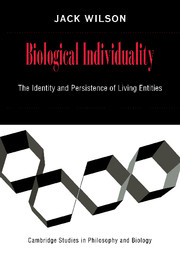Book contents
- Frontmatter
- Contents
- Acknowledgements
- 1 Beyond Horses and Oak Trees
- 2 The Biological and Philosophical Roots of Individuality
- 3 Individuality and Equivocation
- 4 The Necessity of Biological Origin and Substantial Kinds
- 5 Generation and Corruption
- 6 Personal Identity Naturalized
- Appendix: Identity and Sortals
- Notes
- References
- Index
4 - The Necessity of Biological Origin and Substantial Kinds
Published online by Cambridge University Press: 05 December 2011
- Frontmatter
- Contents
- Acknowledgements
- 1 Beyond Horses and Oak Trees
- 2 The Biological and Philosophical Roots of Individuality
- 3 Individuality and Equivocation
- 4 The Necessity of Biological Origin and Substantial Kinds
- 5 Generation and Corruption
- 6 Personal Identity Naturalized
- Appendix: Identity and Sortals
- Notes
- References
- Index
Summary
A VALID ARGUMENT FOR SORTAL ESSENTIALISM
In this chapter I argue that a living individual of any kind necessarily has its actual biological origins. This assertion may initially seem to be a scholastic aside to the question of individuation, but a short summary of the previous chapters will show that the necessity of origin will play an important part in my overall argument. I have demonstrated that the substantial kinds philosophers have generally considered to be the substantial kinds for living individuals do not seem appropriate when applied beyond the most basic familiar examples. I have proposed an alternative to these substantial kinds that better explains biological individuality and grounded these suggestions in a theory of natural kinds.
I established that the existence of real living individuals depends on the existence of real substantial kinds that those individuals exemplify. The substantial kind for a living thing marks the boundaries of the sort of change that entity can undergo without ceasing to exist. If an entity is a living thing of a substantial (natural) kind, it cannot cease to have the properties characteristic of that kind without ceasing to exist. An entity's substantial kind marks those properties as essential to the continued existence of a thing if it originates as a member of that substantial kind. If x is of kind K, x cannot cease to have the properties essential to kind K.
- Type
- Chapter
- Information
- Biological IndividualityThe Identity and Persistence of Living Entities, pp. 69 - 85Publisher: Cambridge University PressPrint publication year: 1999



